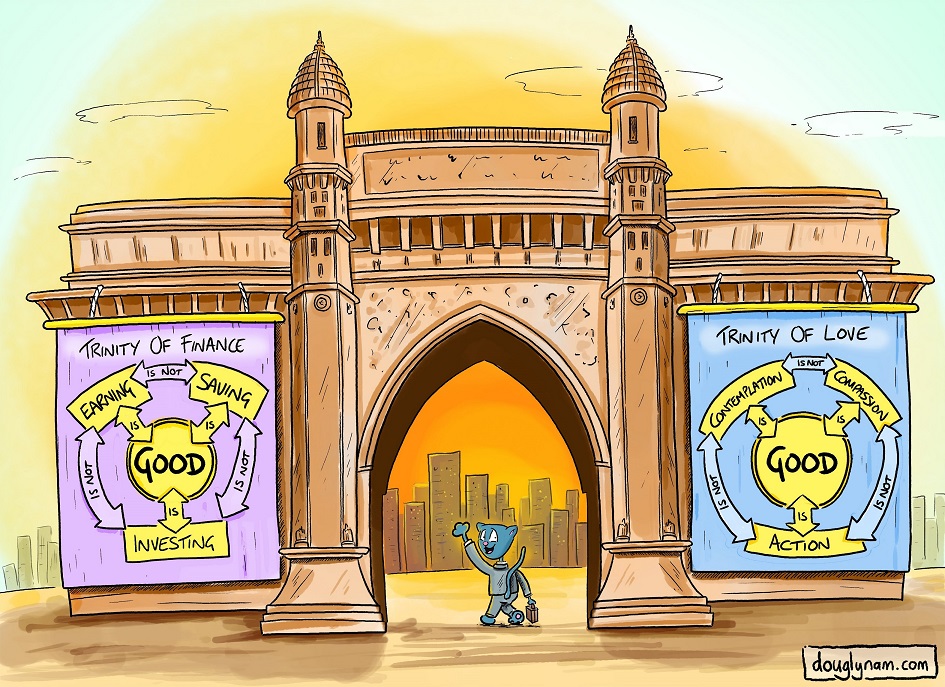Is there a connection between your socioeconomic status and your spiritual maturity? For example, if you won the lottery tomorrow, would that make you a better or worse person?
I used to believe that money was evil, and that rich people were, by definition, selfish. However, the paradoxical fact is that if you earn an income of $32,400 per year, then you are among the top 1 percent of income earners in the world, according to the Global Rich List.
So, congratulations, most of us are technically rich. It doesn’t feel like it with the money stress we all face, but it’s true.
I’ve also lived financial extremes: I was born into a wealthy family, ran away in disgust, then took a vow of poverty and became a Benedictine monk for 20 years. Our monastery also when bankrupt, and now I’m a financial advisor who manages millions of dollars. Along the way, I’ve met good and bad people at every stage of the journey.
It took me a long time to realize that there is no correlation between your socioeconomic status and your capacity for kindness.
While poverty is a humbling and often painful experience, poverty is not a precondition for humility. And just because some wealthy people are unethical, that doesn’t mean wealth creates unethical people. How you earn and spend your money impacts your character but having -- or not having -- money doesn’t predestine your soul.
However, we’ve gotten ourselves into trouble historically by assuming that wealth is correlated to either spiritual maturity or immorality, leading to a plethora of philosophical potholes and dead ends.
The four follies of faith and finance are:
- The Prosperity Gospel: The idea that God loves the rich more than the poor.
- Liberation Theology: The idea that God loves the poor more than the rich.
- Ayn Rand’s philosophy: The idea that the rich are more virtuous than the poor.
- Holy Poverty: The idea that the poor are more virtuous than the rich.
Each folly suffers from dualistic thinking about money: That good or bad, virtue or vice, is determined by your net worth.
The truth is more nuanced: It’s not the size of your portfolio that matters, but the quality of your compassion. Money is just a spiritual sponge – it absorbs the intent of the user. This means we need to be mindful and ethical in our financial habits, not simply hate or idolize money.
As I’ve said before in this column, all personal finance can be summed up by the Holy Trinity of Finance, which I define as Earning, Saving, and Investing. The rest is just commentary. However, there is a parallel truth that sums up the spiritual adventure. I call it the Holy Trinity of Love: Contemplation, Compassion, and Action.
Financial success requires us to continually cycle through the process of earning, saving, and investing. That process spirals upwards towards greater financial security.
The spiritual adventure requires us to continually cycle through contemplation, compassion, and action. That process spirals upwards towards great spiritual maturity.
Each of the Four Follies fails to appreciate that those two trinities aren’t connected. You can excel at one but flop in the other.
However, basic competence at both the Trinity of Finance and the Trinity of Love is necessary for a full life. Because here is the painful truth: According to Tom Boyce, the former chief of the University of California San Francisco’s Division of Developmental Medicine, “Socioeconomic status is the most powerful predictor of disease, disorder, injury, and mortality we have.”
It’s scientifically proven -- It sucks to be poor.
Ironically, some of my well-meaning friends who want to end poverty also decry wealth. And yet wealth is the only antidote to poverty. The Trinity of Love compels us to stand with the oppressed and marginalized, but bringing resources to the struggle helps — a lot.
However, money won’t solve all our problems. Worst of all is when we obsess over money but fail to love.
There is a middle way that balances our responsibility to both the material and the spiritual worlds. With mindfulness, we can joyfully journey in the generous space that upholds both the Trinity of Finance and the Trinity of Love.
Happy Travels!
Doug Lynam is a partner at LongView Asset Management in Santa Fe and a former monk. He is the author of From Monk to Money Manager: A Former Monk’s Financial Guide to Becoming A Little Bit Wealthy — And Why That’s Okay. Contact him at douglas@longviewasset.com

